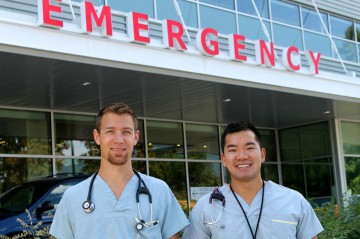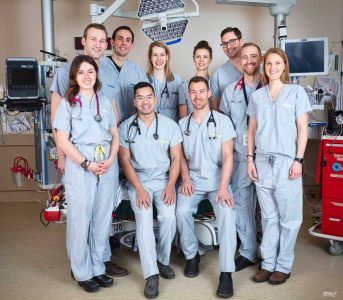First-year UBC emergency medicine residents Daniel Ting and Jared Baylis were on call at Kelowna General Hospital in 2014 when a tour bus carrying 56 tourists crashed on the Coquihalla Highway.

Emergency physicians Drs. Daniel Ting, Kevin Clark and Jared Baylis in June 2019
“In that time of crisis and high stress, teams can either come together or break apart. I remember how our hospital really chose to come together to deliver the best possible patient care,” Ting said. “It was a moment of collegiality that represents a huge part of why I have enjoyed working in Kelowna and what makes the local working environment special.”
Now, five years later, Drs. Ting and Baylis are the first two residents to graduate from the Kelowna Emergency Medicine Residency Program.

Drs. Baylis and Ting at the start of their five-year emergency medicine residencies in 2014.
This summer Ting will start clinical work at Vancouver General Hospital and BC Children’s Hospital while Baylis is staying at Kelowna General Hospital (KGH) as a full-time member of the emergency physician group.
“I am fortunate to have been hired on here in Kelowna,” Baylis said. “The emergency department at KGH has developed and grown so much over the last five to 10 years. I consider it a privilege to continue my journey here.”
Dr. Kevin Clark, program director of the emergency medicine residency program and a clinical associate professor in the Faculty of Medicine, says the learning environment fosters a strong sense of belonging.
“By training medical residents in the interior of B.C., they are more likely to stay on and practice in the community,” Clark said. “They feel a connection here because they live and train here for many years.”
There are 10 residents in the program with two new residents starting each year. Ting and Baylis call their experience as the first two residents to go through the program “a privilege of a lifetime.”

The 10 residents in the Kelowna Emergency Medicine Residency Program in December 2018.
“Watching our residency program grow to its full complement of residents and witnessing their maturation from junior to senior residents, from learners to teachers, has been incredibly satisfying,” said both Drs. Baylis and Ting. “Our training program has evolved and developed in so many directions. We have cultivated a culture of teaching, established a local resident research fund, and introduced program retreats to enhance team bonding. These are things we will both cherish for the rest of our careers.”
“By training medical residents in the interior of B.C., they are more likely to stay on and practice in the community.”
Dr. Kevin Clark, program director
Moving forward, Ting will develop his academic interests in knowledge translation and medical publishing through roles on the editorial board at the Canadian Journal of Emergency Medicine and the medical blog CanadiEM. Baylis will work both clinically and academically as a leader in medical simulation at KGH.
Clark says the program provides residents an unparalleled opportunity to train in a large medical centre.
“The clinical experience is second to none. Residents get a lot of close attention because we only have 10 of them,” Clark said. “The emergency physicians have a keen interest in the program succeeding and are very engaged. They treat the residents as part of our greater emergency family and really take ownership of their learning. It is an ideal learning culture and environment.”
Welcome to Kelowna EM by Kevin Clark from Kelowna Emergency Medicine.
To learn more about the Kelowna Emergency Medicine Residency Program visit this website.